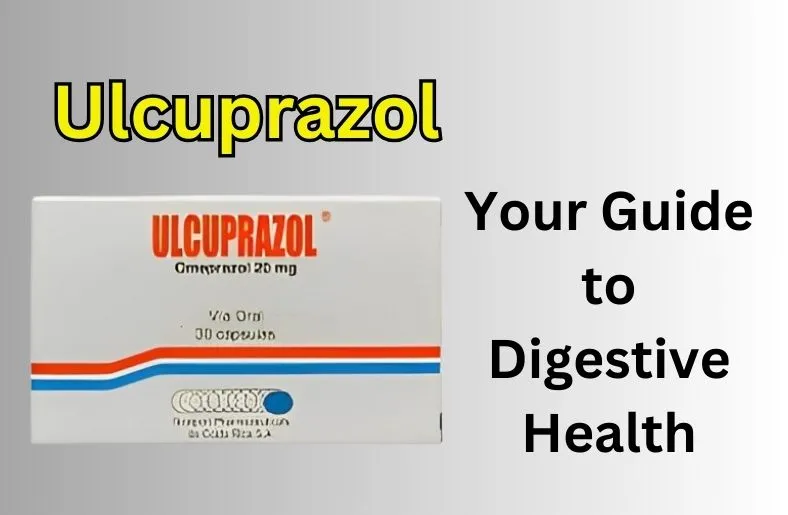Introduction of ulcuprazol
Discovering the role of Ulcuprazol in digestive health unveils a journey of relief for various gastrointestinal issues. As a potent proton pump inhibitor (PPI), Ulcuprazol targets excessive stomach acid production, easing conditions like peptic ulcers, GERD, and even Zollinger-Ellison syndrome. This medication’s mechanism, dosage nuances, potential side effects, and precautions offer a comprehensive understanding crucial for informed healthcare decisions. Unraveling Ulcuprazol’s impact on digestive well-being is not just about treatment but empowerment with knowledge for a healthier tomorrow.
Understanding Digestive Disorders
Digestive disorders encompass a range of conditions affecting the gastrointestinal tract. These disorders can cause discomfort and disrupt daily life. Common digestive issues include peptic ulcers, gastroesophageal reflux disease (GERD), and Zollinger-Ellison syndrome.
Peptic ulcers are sores that develop on the stomach lining, small intestine, or esophagus due to factors like bacterial infection or long-term use of NSAIDs. GERD occurs when stomach acid flows back into the esophagus, causing heartburn and irritation. Zollinger-Ellison syndrome is a rare condition characterized by excessive stomach acid production, leading to ulcers and other complications.
These disorders can result from various factors such as diet, lifestyle, genetics, and underlying medical conditions. Symptoms may include abdominal pain, heartburn, indigestion, bloating, and nausea.
Effective management of digestive disorders often involves lifestyle changes, dietary modifications, and medications like Ulcuprazol. Ulcuprazol, a proton pump inhibitor, reduces stomach acid production, providing relief from symptoms and promoting healing of ulcers.
Understanding the nature of digestive disorders is crucial for proper diagnosis and treatment. Consulting healthcare professionals for accurate assessment and personalized management is essential for maintaining digestive health.
How Ulcuprazol Works
Ulcuprazol operates as a proton pump inhibitor (PPI), a class of drugs known for reducing stomach acid production. It targets the proton pump within the stomach lining, the key player in acid secretion. By inhibiting this pump, Ulcuprazol significantly decreases acid levels in the stomach.
When you ingest food, your stomach cells respond by releasing gastric acid necessary for digestion. However, in conditions like peptic ulcers or GERD, this acid production can become excessive, leading to discomfort and damage.
Ulcuprazol intervenes precisely at this point. By blocking the proton pump’s activity, it limits the amount of acid produced, alleviating symptoms such as heartburn, indigestion, and acid reflux. This mechanism not only provides relief but also promotes the healing of ulcers and prevents their recurrence.
The effectiveness of Ulcuprazol lies in its ability to maintain a balanced pH in the stomach. This balanced environment supports healthy digestion while preventing the erosion of the stomach lining caused by excess acid. Consequently, it plays a crucial role in restoring digestive health and improving overall well-being.
In summary, Ulcuprazol’s mechanism of action involves targeted inhibition of the proton pump, leading to reduced stomach acid production. This approach not only addresses immediate symptoms but also supports long-term healing and prevention of digestive disorders.
Uses of Ulcuprazol
- Treatment of Peptic Ulcers: Explain how Ulcuprazol helps heal ulcers by reducing stomach acid levels and creating a favorable environment for tissue repair.
- Management of GERD: Describe how Ulcuprazol alleviates symptoms of GERD like heartburn and regurgitation by decreasing acid reflux through reduced acid production.
- Addressing Zollinger-Ellison Syndrome: Discuss Ulcuprazol’s role in managing this rare condition characterized by excessive stomach acid production, emphasizing its ability to curb acid secretion and mitigate digestive tract complications.
- Combating Helicobacter pylori Infections: Mention Ulcuprazol’s use in combination with antibiotics to treat infections caused by H. pylori, a common contributor to peptic ulcers.
- Overall Therapeutic Benefits: Summarize Ulcuprazol’s effectiveness in treating various digestive disorders, highlighting its role in improving patients’ quality of life and restoring digestive health.
Side Effects and Precautions
While Ulcuprazol is generally well-tolerated, it’s essential to be aware of potential side effects and take necessary precautions:
- Common Side Effects: Ulcuprazol may cause mild side effects like headaches, diarrhea, and nausea. These usually subside with continued use.
- Serious Side Effects: In rare cases, Ulcuprazol can lead to more severe reactions such as allergic responses, liver issues, and low magnesium levels.
- Allergic Reactions: Watch out for signs of allergic reactions such as rash, itching, swelling, dizziness, or trouble breathing, and seek immediate medical attention if they occur.
- Liver Health: Inform your doctor of any liver problems before taking Ulcuprazol, as it may require dosage adjustments or alternative treatments.
- Magnesium Levels: Long-term use of Ulcuprazol can lower magnesium levels, leading to symptoms like muscle spasms, irregular heartbeat, or seizures. Consult your doctor if you experience such symptoms.
- Pregnancy and Breastfeeding: Discuss with your healthcare provider the risks and benefits of using Ulcuprazol during pregnancy or while breastfeeding, as its safety in these situations is not fully established.
- Drug Interactions: Inform your doctor about all medications you’re taking, including over-the-counter drugs and supplements, to avoid potential interactions that could affect Ulcuprazol’s effectiveness or safety.
- Alcohol and Smoking: Avoid excessive alcohol consumption and smoking while using Ulcuprazol, as they can exacerbate certain side effects and interfere with its efficacy.
By being aware of these potential side effects and taking necessary precautions, you can safely and effectively benefit from Ulcuprazol’s therapeutic effects.
Dosage and Administration
Ulcuprazol comes in oral tablet form and is typically taken once a day. The recommended dosage depends on the specific condition being treated and individual response. It’s crucial to follow your healthcare provider’s instructions carefully.
For peptic ulcers and GERD, Ulcuprazol is usually taken in the morning before breakfast, as this helps optimize its effectiveness throughout the day. Taking it at the same time each day can also help establish a routine and ensure consistent therapeutic levels in the body.
It’s essential not to crush or chew Ulcuprazol tablets, as they are designed for gradual release in the stomach. Swallow the tablet whole with a full glass of water to aid in swallowing and ensure proper absorption.
If you miss a dose, take it as soon as you remember, but if it’s almost time for your next dose, skip the missed one and continue with your regular schedule. Avoid doubling up on doses to make up for a missed one, as this can increase the risk of side effects.
Always store Ulcuprazol at room temperature away from moisture and heat, and keep it out of reach of children. If you have any questions or concerns about the dosage or administration of Ulcuprazol, consult your healthcare provider for guidance.
Interactions and Considerations
Before taking Ulcuprazol, inform your healthcare provider about all medications you’re currently taking, including over-the-counter drugs and supplements. This helps avoid potential interactions that could affect Ulcuprazol’s effectiveness or cause adverse effects.
Certain medications, such as antibiotics, antifungal drugs, and blood thinners, may interact with Ulcuprazol, altering its absorption or metabolism in the body. Always follow your healthcare provider’s guidance regarding medication interactions.
It’s crucial to avoid alcohol consumption while taking Ulcuprazol, as alcohol can increase the risk of stomach irritation and worsen certain digestive conditions. Similarly, refrain from smoking, as it can also exacerbate digestive issues and interfere with Ulcuprazol’s efficacy.
If you have any underlying medical conditions, such as liver disease or osteoporosis, discuss them with your healthcare provider before starting Ulcuprazol. Some conditions may require adjustments to the dosage or additional monitoring while taking this medication.
Regular follow-ups with your healthcare provider are essential to monitor your response to Ulcuprazol and address any concerns or changes in your health condition. Be proactive in reporting any new symptoms or side effects to ensure safe and effective use of Ulcuprazol.
Conclusion
In conclusion, Ulcuprazol stands as a cornerstone in the realm of digestive health, offering relief and healing for a spectrum of gastrointestinal ailments. From combating peptic ulcers to managing GERD and addressing rare conditions like Zollinger-Ellison syndrome, Ulcuprazol’s efficacy is evident. Understanding its mechanism, dosage nuances, potential side effects, and precautions empowers individuals to make informed healthcare decisions. By navigating through the intricacies of digestive disorders and Ulcuprazol’s therapeutic benefits, this guide paves the way for a healthier tomorrow. Embracing knowledge, seeking professional guidance, and prioritizing digestive well-being are pivotal steps in harnessing Ulcuprazol’s potential for optimal health.





